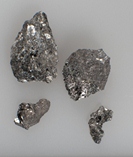Home > Press > First discovery of a natural topological insulator
 |
| The mineral Kawazulite is a natural “topological insulator,” a material that could have applications in a new genre of supercomputers.
Credit: American Chemical Society |
Abstract:
In a step toward understanding and exploiting an exotic form of matter that has been sparking excitement for potential applications in a new genre of supercomputers, scientists are reporting the first identification of a naturally occurring "topological insulator" (TI). Their report on discovery of the material, retrieved from an abandoned gold mine in the Czech Republic, appears in the ACS journal Nano Letters.
First discovery of a natural topological insulator
Washington, DC | Posted on March 6th, 2013Pascal Gehring and colleagues point out that synthetic TIs, discovered only a decade ago, are regarded as a new horizon in materials science. Unlike conventional electrical insulators, which do not conduct electricity, TIs have the unique property of conducting electricity on their surface, while acting as an insulator inside. Although seemingly simple, this type of surface could allow manipulation of the spin of an electron, paving the way for development of a quantum computer. Such a computer would crunch data much faster than today's best supercomputers.
The research team describes discovering that the mineral Kawazulite, found in the Czech gold mine and processed into nanoflakes, is a natural TI. The flakes were so small that thousands would fit inside the dot over an "i." Based on the discovery, natural TIs may exist in other minerals, the report states. Scientists, they recall, once believed that quasi-crystals — topic of the 2011 Nobel Prize in Chemistry — were available only synthetically, but those materials recently were discovered in sky-fallen meteorites.
####
About American Chemical Society (ACS)
The American Chemical Society is a nonprofit organization chartered by the U.S. Congress. With more than 163,000 members, ACS is the world’s largest scientific society and a global leader in providing access to chemistry-related research through its multiple databases, peer-reviewed journals and scientific conferences. Its main offices are in Washington, D.C., and Columbus, Ohio.
For more information, please click here
Contacts:
Pascal Gehring
Max-Planck-Institut für Festkörperforschung
Heisenbergstrasse 1, D-70569 Stuttgart
Germany
Science Inquiries:
Michael Woods
editor
202-872-6293
General Inquiries:
Michael Bernstein
202-872-6042
Copyright © American Chemical Society (ACS)
If you have a comment, please Contact us.Issuers of news releases, not 7th Wave, Inc. or Nanotechnology Now, are solely responsible for the accuracy of the content.
| Related News Press |
News and information
![]() Simulating magnetization in a Heisenberg quantum spin chain April 5th, 2024
Simulating magnetization in a Heisenberg quantum spin chain April 5th, 2024
![]() NRL charters Navy’s quantum inertial navigation path to reduce drift April 5th, 2024
NRL charters Navy’s quantum inertial navigation path to reduce drift April 5th, 2024
![]() Discovery points path to flash-like memory for storing qubits: Rice find could hasten development of nonvolatile quantum memory April 5th, 2024
Discovery points path to flash-like memory for storing qubits: Rice find could hasten development of nonvolatile quantum memory April 5th, 2024
Quantum Computing
![]() Simulating magnetization in a Heisenberg quantum spin chain April 5th, 2024
Simulating magnetization in a Heisenberg quantum spin chain April 5th, 2024
![]() Discovery points path to flash-like memory for storing qubits: Rice find could hasten development of nonvolatile quantum memory April 5th, 2024
Discovery points path to flash-like memory for storing qubits: Rice find could hasten development of nonvolatile quantum memory April 5th, 2024
![]() With VECSELs towards the quantum internet Fraunhofer: IAF achieves record output power with VECSEL for quantum frequency converters April 5th, 2024
With VECSELs towards the quantum internet Fraunhofer: IAF achieves record output power with VECSEL for quantum frequency converters April 5th, 2024
![]() Chemical reactions can scramble quantum information as well as black holes April 5th, 2024
Chemical reactions can scramble quantum information as well as black holes April 5th, 2024
Announcements
![]() NRL charters Navy’s quantum inertial navigation path to reduce drift April 5th, 2024
NRL charters Navy’s quantum inertial navigation path to reduce drift April 5th, 2024
![]() Discovery points path to flash-like memory for storing qubits: Rice find could hasten development of nonvolatile quantum memory April 5th, 2024
Discovery points path to flash-like memory for storing qubits: Rice find could hasten development of nonvolatile quantum memory April 5th, 2024
Aerospace/Space
![]() Under pressure - space exploration in our time: Advancing space exploration through diverse collaborations and ethical policies February 16th, 2024
Under pressure - space exploration in our time: Advancing space exploration through diverse collaborations and ethical policies February 16th, 2024
![]() Bridging light and electrons January 12th, 2024
Bridging light and electrons January 12th, 2024
![]() Manufacturing advances bring material back in vogue January 20th, 2023
Manufacturing advances bring material back in vogue January 20th, 2023
|
|
||
|
|
||
| The latest news from around the world, FREE | ||
|
|
||
|
|
||
| Premium Products | ||
|
|
||
|
Only the news you want to read!
Learn More |
||
|
|
||
|
Full-service, expert consulting
Learn More |
||
|
|
||








